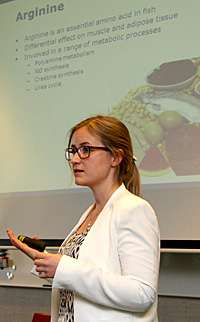More arginine yields little growth effect

While additional arginine increases muscle mass and reduces visceral fat in pigs and rodents, the same additive does not induce faster growth in farmed salmon. Still, the amino acid may benefit salmon health in other ways.
Arginine is one of the ten essential amino acids that the fish must consume through diet. Arginine is not only a building block for proteins in the body, it also plays an important role in a number of chemical processes in salmon, such as the production of polyamines, which are vital for the growth and development of cells.
In other animals the amount of arginine in feed affects the storage of protein and fat and strengthens resistance to stress and disease.
No boost in muscle tissue
Synne Marte Andersen of Norway's National Institute of Nutrition and Seafood Research (NIFES) is a doctoral fellow under the Research Council of Norway's HAVBRUK programme. Her doctoral work involved studying the effects of arginine on energy conversion via polyamines in salmon and how this affects muscle and fat tissue.
In October 2014 she successfully defended her thesis, "Interactions of arginine and polyamines on growth and metabolism in Atlantic salmon", at the University of Bergen. Her work was part of a recently concluded large-scale innovation project headed by EWOS Innovation.
Dr Andersen carried out feeding trials on fry (young juveniles adapted to fresh water, 5 g) and larger salmon (1 kg) in seawater. The trials showed that adding arginine beyond established requirements had a small positive effect on fry growth. The arginine additive also increased gene expression of an enzyme important for fat metabolism in the liver.
"In adult salmon, however, the additional arginine had no effect on growth or the distribution of muscle protein and fat," explains Dr Andersen. "This indicates that the effect of arginine on salmon is not the same as on rodents and pigs."
May provide health effects
Even though additional arginine does not substantially improve growth in salmon, it does have an impact on metabolic processes.
"In studying the liver cells of the salmon," continues Dr Andersen, "one thing we found was that arginine affected glucose metabolism. In further studies we want to find out whether arginine may improve the uptake and utilisation of carbohydrates in feed, which would be significant for fish health and welfare."
She emphasises that there is no indication that increased arginine in the feed has any negative effects on the fish.
Provided by The Research Council of Norway



















